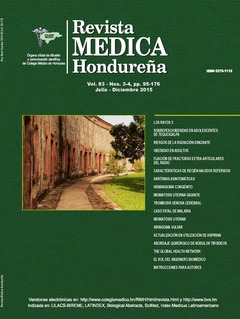Severe and complicated malaria in young adult: report of fatal case from Honduras, Central America
Keywords:
Honduras, Malaria, falciparum, Mortality, Plasmodium falciparumAbstract
Background: Honduras, Central America, endemic of vivax and falciparum malaria, is one of the countries that achieved >75% reduction in cases number in 2013. Clinical case: Female, 20 years old, 60 Kg, evaluated 4-20-2014 in Internal Medicine Emergency, University Hospital (UH), Tegucigalpa, referred from Hospital San Francisco (HSF), Olancho, as severe dengue (fever, chills/diaphoresis, arthralgia/myalgia, blood pressure 80/50 mmHg, thrombocytopenia 49,000/mm3). Two days before she was managed as outpatient (thick smear negative) and was hospitalized on the following day due to clinical deterioration. In UH, she was diagnosed as febrile syndrome in study; one day later required mechanical ventilation due to multiorganic dysfunction. Leptospirosis and HIV tests, negative. Thick smear (21-04-2014) detected Plasmodium falciparum, 0.1% parasitized erythrocytes, mature parasite stages. Quinine was administered (loading/maintenance one dose, expired drug). Patient died 22-4-2014. Visceral impression smears (Giemsa) showed parasites in spleen, liver and kidneys. Olancho Health Region confirmed patient and 6 months old son, visited Taburetillo, Dulce Nombre de Culmi District, two weeks before symptoms onset. Child was hospitalized at HSF (22-4-2014) as falciparum malaria and pneumonia; treated with chloroquine, was discharged improved three days later. One additional case from Taburetillo was diagnosed at HSF (22-04-2014). Active case detection (34 samples) and search for adult and larval vector stages were negative. Conclusion: Timely/appropriate diagnosis and treatment could prevent death in this case. When malaria elimination is accelerated, effective surveillance and treatment of each case is required.
Downloads
922




